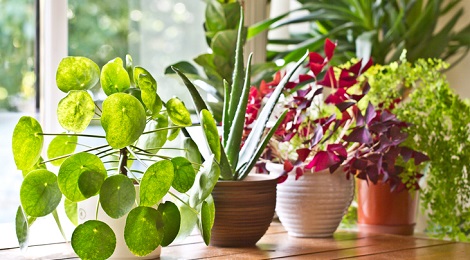Health Benefits of Indoor Plants

Not only do indoor plants make for beautiful home décor, they may also boost your health and well-being. Research suggests we spend more than 85 percent of our lives indoors and houseplants are an easy way to bring nature into your home.
Indoor plants can offer the following benefits:
Improve air quality. There are many things in our homes that create air pollution – cleaning products, paint, mold and mildew. Plants also replace carbon dioxide with fresh oxygen. Microorganisms in the soil of the plant help clean the air as well, these microorganisms have also been found to have anti-depressive effects.
According to a 1989 NASA study, houseplants can help improve air quality by removing cancer-causing chemicals like formaldehyde and benzene from the air. Another study found that the soil in potted plants can also help clean indoor air.
The bigger and leafier the plant, the better, says the NASA study author. Peace lilies, bamboo, aloe vera, figs and Boston ferns are fantastic for this.
Reduce stress. A 2015 study found that caring for indoor plants reduced psychological and physiological stress in study participants. Interacting with plants helped suppress sympathetic nervous system activity and diastolic blood pressure. Participants reported feelings of comfort when working with plants versus working on a computer.
“There are many psychological benefits to spending time outdoors – it creates a sense of belonging and connection to something greater than ourselves – and it gives us what I like to call ‘outdoor-phins,’” she says. “When we bring plants inside, we are welcoming nature into our own space.”
Improve your sense of well-being. A Scandinavian study found that exposure to indoor plants improved feelings of well-being in participants compared to those who weren’t exposed to plants. And we know that feelings of well-being can help improve your physical health too.
Studies have shown that indoor plants can improve focus, decrease depressive moods and lessen symptoms of anxiety, when your mind and body are relaxed, it can improve your blood pressure, heart rate and cortisol levels.
Support cognitive health. Exposure to indoor plants helped people recover from mental fatigue, researchers found.
“A Rutgers study found that people with dementia showed improved short-term memory after a session in a Japanese garden.”
Improve environmental wellness. Our environment has a major impact on our overall wellness, all areas of our wellness are interconnected. Living in an environment that is healthy and peaceful can be beneficial to your overall wellness. Our home is our sanctuary and a place for us to recharge.
A symbiotic relationship. One of the best things about caring for indoor plants is the beautiful exchange that happens: Plants depend on us for care and in turn, they take care of us by improving the air we breathe and making our space more beautiful. I also think plants are hopeful. As they grow and blossom, they can be an important reminder for us of things to come.

